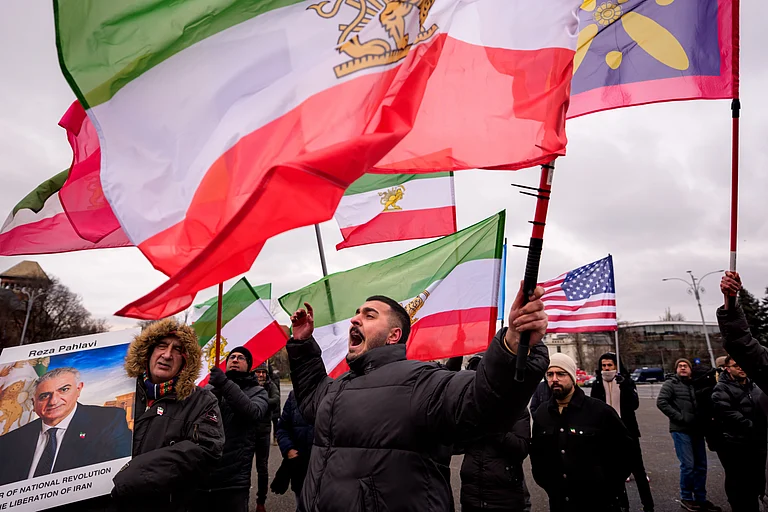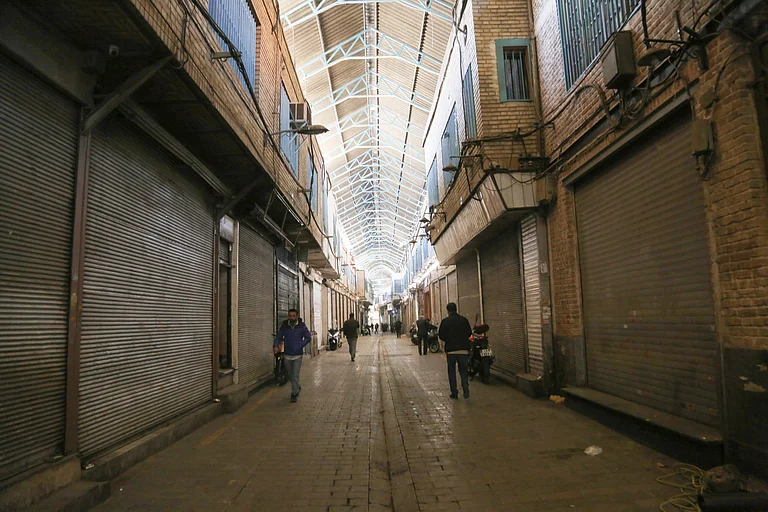With each day, fears of a regional war breaking out in the Middle East are increasing as Israel continues to fight on two fronts, against Hezbollah in Lebanon and in Gaza. This isn't all, Iran's missile attack on Israel managed to further add to the worries of the people residing in the region and the rest of the world.
Fighting on two fronts on Wednesday, Israel had pursued a ground offensive into Lebanon against Hezbollah, in which eight of its soldiers were killed. The Israeli military also carried out strikes in Gaza, killing dozens of people.
Israel Defense Forces on Thursday said that a pair of drones set off sirens in central Israel's Bat Yam, one of which was intercepted by the air force while the other hit an open area. The overnight attack which came amid the celebration of Jewish new year -- Rosh Hashanah -- reported no injuries.
Meanwhile in Gaza, the nearly year-long war has no end in sight as Israel continues to strike and fight with Hamas. Palestinian health officials said that Israeli ground ops and airstrikes in a hard-hit city killed at least 51 people.
Middle East Tensions | Key Points
Senior Hamas Leader Killed 3 Months Ago, Says Israel
The Israeli military on Thursday said that it killed a senior Hamas leader in an airstrike in the Gaza Strip around three months ago.
The strike on an underground compound in northern Gaza killed Rawhi Mustaha and two other commanders of the terror outfit -- Sameh Siraj and Sameh Oudeh.
The military said that the three commanders had taken refuge in the fortified underground compound which acted as a command and control center.
Mustaha was reportedly a close associate of Yahya Sinwar, Hamas' top leader who masterminded the October 7 attack into Israel. Sinwar is believed to be alive and in hiding inside Gaza.
Nasrallah, Netanyahu Had Agreed To Ceasefire
Lebanese foreign minister Abdallah Bou Habib told CNN that slain Hezbollah leader Hassan Nasrallah had agreed to a 21-day ceasefire with Israel days before his assassination.
The temporary ceasefire was called for by US President Joe Biden, his French counterpart Emmanuel Macron and other allies during the UN General Assembly session in New York last week.
"He (Nasrallah) agreed, he agreed," Habib said during an interview which aired on October 2.
"We agreed completely. Lebanon agreed to a ceasefire but consulting with Hezbollah. The (Lebanese House) Speaker Mr Nabih Berri consulted with Hezbollah and we informed the Americans and the French what happened. And they told us that Mr Netanyahu also agreed on the statement that was issued by both presidents (Biden and Macron," Habib was quoted as saying.
Following this, he said, White House senior adviser Amos Hochstein was supposed to go to Lebanon and negotiate the ceasefire deal. "They told us that Mr Netanyahu agreed on this and so we also got the agreement of Hezbollah on that and you know what happened since then," Habib added.
8 Israeli Soldiers Killed In Southern Lebanon
In its ground operation against Hezbollah in Lebanon, Israeli military lost eight of its soldiers on Wednesday during the offensive in the southern region of the country.
"Captain Eitan Itzhak Oster, Captain Harel Etinger, Captain Itai Ariel Giat, Sergeant First Class Noam Barzilay, Sergeant First Class Or Mantzur, Sergeant First Class Nazaar Itkin, Staff Sergeant Almken Terefe and Staff Sergeant Ido Broyer, all fell during combat against Hezbollah terrorists in southern Lebanon," Israeli Defense Forces announced.
Israeli Prime Minister Benjamin Netanyahu expressed condolences over the demise of the soldiers. He further said, "We are in the middle of a tough war against Iran's axis of evil, which seeks to destroy us. This will not happen, because we will stand together, and with God's help - we will win together."
"We will return our abductees in the south, we will return our residents in the north, we will guarantee the eternity of Israel," Netanyahu added.
Meanwhile, the Lebanese militant group said that its fighters clashed with Israeli troops in two places inside Lebanon near the border. Israeli military said that forces on the ground with the backing of airstrikes killed militants in "close-range engagements".
The Lebanese army also said that Israeli troops advanced some 400 meters across the border and withdrew "after a short period", making it to be its first such confirmation of an incursion.
Late on Wednesday, an Israeli airstrike struck an apartment building near Beirut's city centre, the second time Israel has hit Lebanon's capital this week. At least two people were killed and 11 others injured in the strike, the Lebanese health ministry said.
Hezbollah's Al-Manar TV said that the Israeli strike was aimed at a center of the terror group's health unit.
Notably, Israeli forces have warned over 50 villages and towns, some 60 kilometers from the border, to evacuate amid the increasing strikes. These villages are much farther than the northern edge of a UN-declared zone, meant to serve as a buffer between Israel and Hezbollah after their 2006 war. With Israel's warning, hundreds of thousands of people have already fled their homes.
Israel has reaffirmed that it will continue to strike Hezbollah until it is safe for tens of thousands of its citizens displaced from their homes near the Lebanon border to return. Meanwhile, Hezbollah vowed to keep attacking Israel until a complete ceasefire is reached in Gaza. The Iran-backed militant group is also fighting against Israel after the pagers and walkie-talkie blasts killed several of its members, and the recent killing of its leader Hassan Nasrallah.
According to the Lebanese health ministry, Israeli strikes have claimed the lives of 1,000 people in Lebanon over the past two weeks, nearly a quarter of which were women and children.
Iran Pushes The Fear Of War
Iran, which backs both Hezbollah and Hamas, launched a barrage of missiles into Israel on Tuesday, prompting another escalation in the Middle East and pushing towards an all-out war. Israel warned Iran of serious "repercussions" with Prime Minister Benjamin Netanyahu saying that the latter would "pay the price" for the attack.
Iran had said that its strike against Israel was a retaliation for a series of devastating blows landed against Hezbollah, which has been firing rockets into Tel Aviv in support of Hamas since the war on Gaza began.
Biden Won't Support Strike On Iranian Nuclear Sites
As Israel weighs in on responding to Iran's missile attack on its land, US President Joe Biden on Wednesday said that he will not support an Israeli strike on sites related Tehran's nuclear program.
"The answer is no," Biden told reporters on being asked if he would support such a retaliation to Iran's missile barrage on Israel.
The US President's comments came in the backdrop of him and his fellow G7 leaders from Canada, France, Germany, Italy, Japan and the United Kingdom spoke over a phone call about issuing new sanctions against Iran.
Issuing a statement, the White House said that G7 leaders "unequivocally condemned Iran's attack against Israel", adding that Biden asserted America's "full solidarity and support to Israel and its people".
Biden noted that he supports Israel's right to defend itself, saying that "there are things that have to be done" in response to Iran's missile attack. The G7 nations will announce their sanctions soon, Biden expected.
"We will be discussing with the Israel what they are going to do. All seven of us agree that they have a right to respond," Biden told reporters. He also said that he planned to speak with Netanyahu "relatively soon".
Meanwhile, Italian PM Giorgia Meloni's office also issued a statement, saying that the leaders expressed "strong concern for the escalation of these last hours" and pressed on that "a conflict on a regional scale is in no one's interest." Currently, Italy holds the rotating presidency of the G7 group of industrialised democracies.
Israel has a range of choices to pick from when it comes to responding to the Iranian barrage. But, targeting the controversial nuclear program of Iran is seen as the most provocative action that Israel could take.
Notably, the US military helped Israel defend itself against the attack that Iran carried out in retaliation for the killing of Hezbollah leaders.
Deputy Secretary of State Kurt Campbell said there "must be a return message" to Iran. He said the US and Israel officials continue to discuss the response.
"At the same time, I think we recognise as important as the response of some kind should be, there is a recognition that the region is really balancing on a knife's edge," Campbell said.
Israel Slams UN, Bans Its Chief In Country
Israel slammed the United Nations and declared its chief, Secretary-General Antonio Guterres persona non grata, or banned from entering the country. Israeli Foreign Minister Israel Katz accused Guterres of failing to unequivocally condemning Tuesday's Iranian barrage.
Following Iran's attack on Israel, Guterres had issued a statement saying, "I condemn the broadening of the Middle East conflict, with escalation after escalation. This must stop. We absolutely need a ceasefire."
Israel's action against the UN chief further deepens the already existing rift between Tel Aviv and the United Nations.
The UN, reacted to Israel's ban on Guterres, and described Katz's announcement as a "political statement". The global body said that its contact with Israel will however continue "because they have to".
UN spokesman Stephane Dujjaric told reporters that this was "one more attack on the United Nations staff that we've seen from the government of Israel".
Dujjaric strongly disagreed with the accusations levelled against the UN chief by Israel, saying that he has condemned "over and over again the terror attacks, the acts of sexual violence and other horrors that we've seen".
Though Israel's accusations of UN bias and anti-semitism dates back decades, the rift widened after Hamas' October 7 attacks against the country. Israel has accused UNRWA -- UN agency helping Palestinian refugees -- of being Hamas members and participating in the October 7 attacks.


























